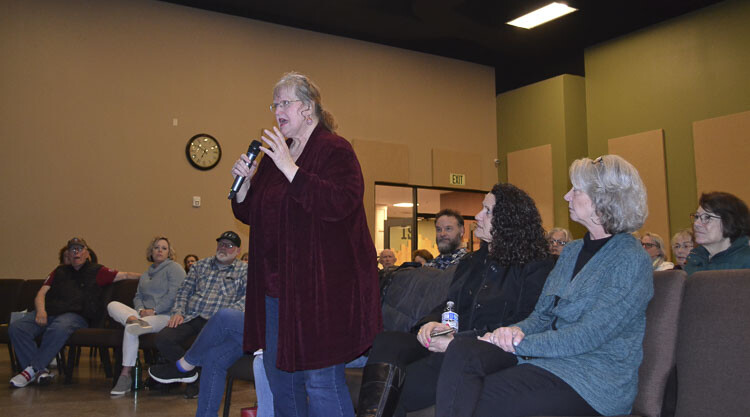
District 2 Councilor Michelle Belkot and Clark County Sheriff John Horch address issues facing Clark County residents
Leah Anaya
For Clark County Today
Clark County District 2 Councilor Michelle Belkot hosted her first Town Hall meeting Thursday since being elected to the County Council. Belkot was joined by newly elected Clark County Sheriff John Horch. In fact, this event marked the first town hall by a District 2 County Councilor in recent years, if ever.
The event was well attended with many questions from the audience, mainly pertaining to the crime rate in the county, which has remained high since reaching unprecedented levels during the COVID-19 pandemic.
Belkot started off by thanking the community members who have written emails or called her to let her know the issues in the district.
“You don’t know what you don’t know,” she said, “and I can’t help with a problem if I don’t know about it.”
The first issue Belkot raised was regarding the tolling that’s being considered for both bridges into Oregon. She recommended that citizens go to the Oregon Department of Transportation website to give their opinion via a survey on the proposed tolls, which she said was going to be four spots along Interstate 5 and five spots along Interstate 205.
“Your opinions really do matter, they really do listen,’’ Belkot said. “We need people to speak up against these tolls.” Citizens have until April 21, 2023 to submit their comments before the decision on whether to allow tolling is made.
The influx of homeless people on the streets was brought up multiple times. Belkot said that she is involved with the Ending Community Homeless Organization (ECHO) for the county, which is tasked with finding solutions for the issues and bringing resources to those in need. She has been informed of the increase of partnerships between Washington Department of Transportation and the Clark County Sheriff’s Office (CCSO) for things like homeless camp sweeps and getting resources to homeless people. Belkot has met with many organizations who exist to assist the homeless, who have told her that a big problem with bringing them help is that they don’t actually want it. “They don’t want to go to a shelter because there are rules there, and they would have to give up things like drugs in order to stay there,” Belkot said.
Further, the county used federal funding from the COVID era to increase spending on the homeless problem. The spending jumped from the original $10 million up to $14 million. For that increase, the county saw an additional 100 beds in homeless shelters. “That’s a 40 percent increase! For 100 beds?” an audience member said. “That’s ridiculous!”
On that topic, Horch said that he is pleased with the partnerships to clean up dangerous and unsanitary homeless camps. Drugs are certainly not helping the homeless situation, Horch said, and neither is the previous years’ legislation regarding drugs. “The Blake decision hurt us a lot by legalizing drugs and taking away the ability for law enforcement to put some of these criminals in jail. I do not believe legalizing drugs is the answer to helping with addiction.”
Horch pointed out that the issue with drugs starts at the US/Mexico border, where law enforcement is “not allowed to do enough to stop the problem where it starts.” Because of that, the drugs are able to make their way up through the states into Washington, where we are seeing a huge rise of fentanyl and overdoses on the same.
“We have to stop the flow of mass amounts of drugs into our country,” Horch said. “We have to do things the right way or we will be heading down a very dangerous path.”
Staffing at CCSO is getting back to steady levels, Horch indicated. “I walk through the halls and see groups of recruits waiting to go to the academy. We are getting there,” he said. To that end, he also said that he has changed the policy of the previous sheriff, Chuck Atkins, for deputies to not respond to certain crimes due to staffing levels. Atkins had issued a letter to the community in March 2022 indicating that deputies would not respond to many property crimes, and instead victims would have to report the crimes online or over the phone.
“That’s not happening,” Horch said when asked if he was still implementing the Atkins-era policy. “An email was sent to deputies several weeks ago. If there’s nothing else going on, no priority calls, they will respond to all those calls. If there are too many other calls going on, they will at least contact the reporting person on the phone and let them know why they can’t come or figure out a time where they are able to meet.”

On staffing in the county in general, Belkot said that a compensation study is currently taking place involving seven counties to attempt to increase employee retention. The county employees were granted a slight bump in salary by the previous council (which would have been in 2022) but apparently there is still an issue with retaining staff and allowing for in-person services. The results of the study are due out within a week. An attendee brought up frustration with a lack of in-person services still so long after closing from the pandemic, especially in the permitting department. Belkot discussed her concerns regarding the high costs of permits plus the months it takes for approval, which is apparently driving builders out of the county. She plans to stay on top of that issue to bring improvement as soon as possible.
The police pursuit bill that’s in the legislature this session was also discussed, with Horch encouraging everyone to contact legislators and ask them to pass it. “It’s not a total fix for what they messed up with pursuits during the big push for police reform, but it’s a large step in the right direction.” Horch was referring to House Bill 1054 passed in 2021 that increased the requirement for police to pursue a criminal in a fleeing car from reasonable suspicion to probable cause, which limited their ability greatly. Current Senate Bill 5352 (which passed the Senate and now sits in committee in the House) would bring that threshold back down to reasonable suspicion for many crimes.
“This bill gives us a lot more leeway,” he said. “This is about public safety, it shouldn’t be bipartisan.” To that, Belkot added that “every county councilor in every county in the state supports the pursuit bill.”
One member of the audience asked about the many abandoned RV’s that can be found around the county. Belkot indicated that there had originally been a contract with a company that would tow them away, but that contract expired. She said a budget for a new contract had recently been approved so residents should see them start to be towed away again. “The other issue,” she said, “is that it’s a two-step process. Many of them are biohazards so there is an extra step to getting them cleared.”
Horch praised Belkot for staying on top of that issue, saying that he has received several emails from her on the topic to make sure they were able to get the issue handled in a timely manner. “I’ve been incredibly impressed with Councilwoman Belkot’s drive to get things accomplished,” Horch said.
“Well,” Belkot responded, “we really do care. I don’t think there’s an elected council member right now who doesn’t really and truly care about the issues affecting the communities. Remember, we are all your neighbors. Your problems are likely ours too.”
Belkot also said she wants to continue to work with schools in the area, who are insufficient in safety, she said. A group of parents found that 33 percent of doors at Columbia River High School do not lock. The school knows about it, but nothing has been done to fix it. Similarly, at Thomas Jefferson, there are so many interior door locking issues that teachers were given zip ties to open their door and apply in the instance of an active shooter. “That’s not acceptable,” Belkot said.
School safety is a priority for CCSO as well, according to Horch. He said they are “committed to getting [school resource officers] back into schools.” He added, “of course their primary duty at the school isn’t for active shooters, it’s to build a relationship with the kids. But it sure helps to deter crime and to have someone there if, God forbid, an active shooter incident should take place.”
Parents need to talk to their children about that topic as well, Horch said. “People don’t want to talk about it, it’s not a fun subject. But it’s incredibly important that parents are telling their kids that they don’t need to just sit there and wait to get shot. They need to run. They need to be prepared and know how to act.”
Finally, Horch said that regional academies are coming to the state, and more specifically to the city of Vancouver.
“This will help with staffing immensely,” he said. “Right now, even if we have hired candidates, they sit around getting paid for what training we can offer them for months in some cases until they can secure a slot in the academy. Regional academies will change that and we will be able to get deputies on the streets quicker.”
Horch also said that body cameras will be introduced to CCSO sometime in the fall.
Also read:
- Vancouver Police release critical incident video from Dec. 28 officer-involved shootingVancouver Police Department released a Critical Incident Video related to a December 28 officer-involved shooting while the Office of Independent Investigations continues its review.
- Opinion: Transit agencies need accountability not increased state subsidyCharles Prestrud argues that Washington transit agencies face rising costs and declining ridership due to governance structures that lack public accountability.
- Letter: ‘For years, American foreign policy too often felt like a blank check’Vancouver resident Peter Bracchi argues that the 2025 National Security Strategy marks a long-overdue shift toward clearer priorities, shared responsibility, and interest-based American leadership.
- POLL: Are you better off than you were a year ago?This week’s poll asks readers to reflect on their personal financial situation and whether they feel better off than they were a year ago as economic conditions continue to shift.
- Opinion: Does tailgating cause speeding?Target Zero Manager Doug Dahl examines whether tailgating contributes to speeding and explains why following too closely increases crash risk with little benefit.
- Opinion: ‘The Democrats’ part of the bargain’Clark County Today Editor Ken Vance reflects on a New Year’s Eve encounter and a Bill Maher commentary to assess what he sees as cultural and political changes from the past year.
- Free fares on New Year’s Eve is a big hit with C-TRAN ridersC-TRAN’s New Year’s Eve free-fare program provided extended late-night service and a safe transportation option for riders across Clark County just after midnight.











